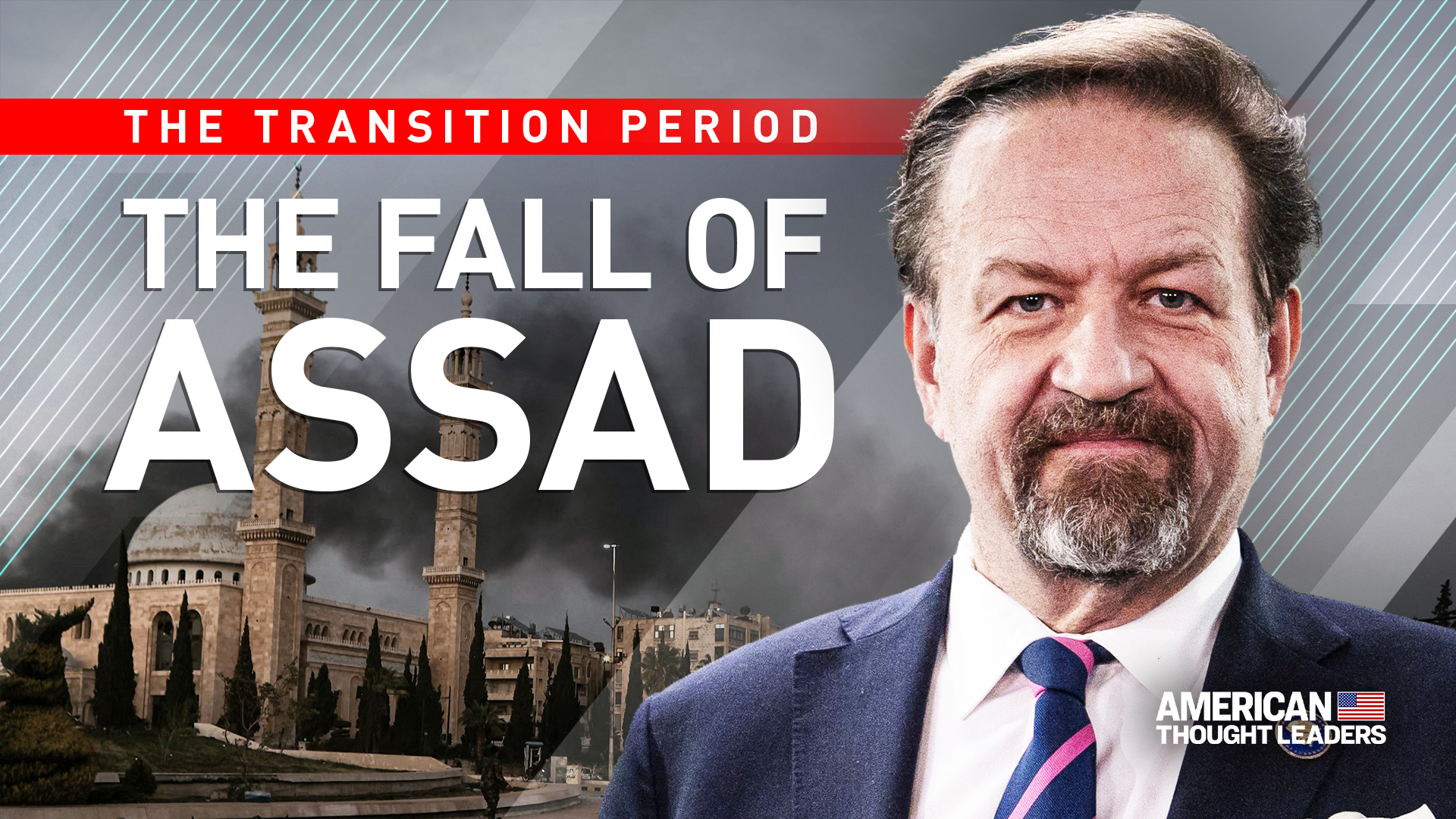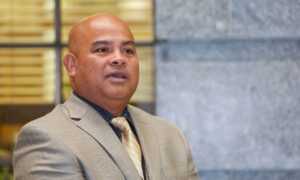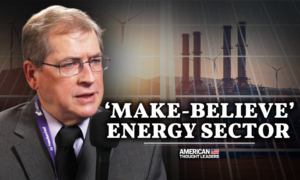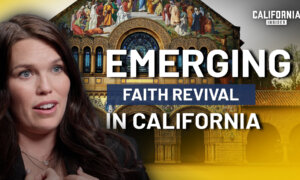[RUSH TRANSCRIPT BELOW] As part of our special series on the U.S. presidential transition period, Sebastian Gorka breaks down the complexities of recent events in Syria, and what the incoming Trump administration’s foreign policy may look like when it comes to NATO, the Middle East, Russia, and China.
Gorka will serve as Trump’s deputy assistant and senior director for counterterrorism at the National Security Council.
Views expressed in this video are opinions of the host and the guest, and do not necessarily reflect the views of The Epoch Times.
RUSH TRANSCRIPT
Jan Jekielek:
Sebastian Gorka, such a pleasure to have you back on American Thought Leaders.
Sebastian Gorka:
Great to be back. Thank you for having me, Jan.
Mr. Jekielek:
We’re going to talk about the incredible complexities of Syria today. But before we go there, congratulations on becoming the Deputy Assistant to the President and Senior Director for Counterterrorism at the National Security Council. That’s an elevated role for this position, as I understand it.
Mr. Gorka:
This is the Byzantine minutiae of White House ranking structures. There are three senior positions inside the White House working for
the president. The highest is assistant to the president. That’s, for example, Mike Waltz, the national security advisor. Then there are people at my rank, Deputy Assistant to the President. And in reverse kind of order,
because it sounds the coolest, the lowest rank is Special Assistant to the President.
These are all abbreviated APs, DAPs and SAPs. It’s very unusual to have somebody of my rank, a Deputy Assistant to the President, to be a Senior Director in the National Security Council. It doesn’t usually happen. It’s a function of having worked for the President already in the first Trump administration. It gives me a little bit more oomph, if you will, to my position running counterterrorism.
Mr. Jekielek:
It seems like terrorism is an elevated issue for America in general right now. Could you comment on that?
Mr. Gorka:
Yes. Sadly, it is for numerous reasons and both extrinsically and internally. So what do we have internally? We have four years of a literal open border. The official Biden figures are eight million illegals let into the country in the last four years.Those are the ones that we know of. If you add to that the so-called gotaways, people who never interact with Customs and Border Patrol or DHS at the border, you can probably safely double it.
So that’s 16 million people who’ve crossed into America who we don’t know who they are. If only 1% of them are malefactors; jihadis, al-Qaeda, ISIS, al-Nusra, and Hamas, then we’re talking about divisional size assets. We’re talking about potentially thousands, if not tens of thousands of malefactors. That’s going to beTom Homan. That’s going to be the border czar. That’s going to be Governor Noem. That’s going to be Kash Patel.
We’re going to have to identify these people and then neutralize them, get them out of America. That’s just the domestic counterterrorism threat. Then if we look externally, where to begin? Biden’s surrender of Afghanistan gives it back to the Taliban. It becomes a safe haven once again for jihadis like al-Qaeda. Then we see the disastrous events in Syria. Don’t get me wrong. The Assad regime was 50 years of just bloodthirsty dictatorship.
But now who’s taken over? It’s a guy who was part of ISIS. This person who says, oh, I like minorities now. Well, jihadis rarely become moderate, especially after they attain power. There is much for us to do, day one, when it comes to the domestic terrorist threat and when it comes to the recrudescence of global jihadism.
Mr. Jekielek:
The president was saying, let this all play out. What is your thinking about that?
Mr. Gorka:
What people don’t understand about President Trump’s geopolitical stance, and I tried to explain this in the first administration, is he’s not the extreme of a neo-Buchananite isolationist, this wing of the conservative movement that says, who cares about the rest of the world? Pull down the shutters on the Pacific and the Atlantic. It’s irrelevant. He knows that’s asinine because it didn’t work in 1941 in Pearl Harbor. It didn’t work on September the 11th with the al-Qaeda attacks on America.
Yet he’s not the other extreme. He’s not a neoconservative interventionist. He doesn’t believe in this ridiculous concept that, you know, you can go to Afghanistan, you can go to Iraq and create democracy at the end of a gun barrel. What he does, and he’s actually approved this term, I coined the description of his foreign policy as surgical strength. He’s not an interventionist, but when you cross a line, for example, Assad’s use of chemical weapons in Syria, he doesn’t talk about red lines. He takes action.
He drops 52 cruise missiles on that Syrian air base. When he heard that 300 Russian mercenaries were running around the Middle East, he didn’t say, don’t do that, Putin. He ordered the then Secretary of Defense, kill them all. And in the Battle of Khasam, he did what no president has ever done since the 1917 October Revolution. Our forces killed hundreds of Russian military personnel in four hours.
Why? Because he wasn’t going to invade that country and try and create some kind of, you know, panacea paradise. No, he said, Russia, stop destabilizing this region. Stop threatening our troops. I will come down like the hammers of hell. So President Trump has been also, I think that all caps messages with regards to Syria must be put in the context of what the president posted. What was it, 10 days ago with regards to the U.S. hostages who have been taken by Hamas.
I met with the families. They gave me this bring them all home bracelet when I met with them last week. They were so gladdened by what the president said. He said in all caps, if our hostages are not returned by the inauguration, quote, capital letters, there will be all hell to pay. On the line between the insane interventionism of the neocons and ridiculous isolationism of the neo-Buchananites, President Trump is about one thing, peace through strength.
Mr. Jekielek:
I use that example often about the Russian gray zone, mercenary soldiers, with unclear affiliation in Syria. But once they were gone, there were no more interventions, right?
Mr. Gorka:
Right. But there are multiple examples of that. So whether it’s a cruise missile attack on Syria, which happened, remember, during the quasi-state visit of Xi Jinping to Mar-a-Lago. And you can see the footage of President Trump, you know, leaning over the dictator of China, saying through the interpreter over the, you know, the best chocolate cake in the world, oh, by the way, I just turned the Syrian airbase into a sheet of glass.
That act wasn’t just a message for Assad. That was a message for Beijing. That was a message for Kim in North Korea. That was a message for Putin. You cross the line. We’re not going to talk about threats. We’re just going to take action and leave. The same thing with the MOAB that we dropped on al-Qaeda in Afghanistan, or Qasem Soleimani, the most dangerous terrorist leader in the world, the guy who ran all the proxy threat groups for Iran.
What did we do? He had to be recognized by the signet ring that was left on the severed finger after we droned his convoy and took him out when we informed the president he was about to attack upwards of 600 US servicemen in the Middle East. He just said, kill him, and kill him now.
Where did we decide to neutralize Soleimani? On the road to the Iraqi prime minister’s offices in Iraq, sending a message that we know what you’re doing in the region, and this is a message for everyone in the region, that we will not countenance people threatening our interests, and we will take action. So it’s this very precise, overwhelming use of force when necessary, but then in the meantime focusing on U.S. national security, prosperity of America.
Mr. Jekielek:
You mentioned this interaction with Xi Jinping. Why would President Trump, in a very unprecedented move, invite Xi Jinping to the inauguration.
Mr. Gorka:
I haven’t discussed this with him, but I think it’s a genius move. I had Gordon Chang on my show to discuss it last week. There’s two obvious interpretations. Number one, you’re showing the dictator of the world’s largest communist nation a peaceful transition of power. Hey, this is how it should be. You should have a government that represents the people, and 77 million Americans spoke and they said they don’t want Kamala Harris. They don’t want an extension of Obama through Biden. They want President Trump in office. This is how it’s done. This is how the will of the people is exercised.
On top of that, it’s this idea of who’s going to be there? Everybody. Look at the list of heads of state that have already been invited. This is a message that American leadership is back. Recognize it or not at your peril, the old sheriff is back. Either way, it’s a genius move.
Mr. Jekielek:
Let’s jump to Syria. I’ve heard analysis that says this is an utter and complete disaster, that Assad was providing stability in the region. Others say that Syria was a client of Iran and Russia, so it’s very good for American interests to have this regime fall. Please give us a broad picture of the complexity of this situation.
Mr. Gorka:
It is incredibly complex because most of the players or the key players like Jolani, like Assad himself, have switched sides in the last 14, 15 years or have created new allegiances. When you see Assad in recent years trying to make friends with the Saudi regime, what is a client state of Iran doing making friends with the Saudi regime? Because he was desperate to strengthen and shore up his own government, which was under assault from Free Syria forces. So it is beyond just one 30-minute interview to express the complexities of the situation.
But let’s just fix the key points. This regime was truly hellacious. Look at the now released footage, the drone footage of Hama. It wasn’t enough for Assad’s father in 1982 to kill at least 40,000 Arabs in Hama who were against his regime. Now his son did it again. Hama today, if you look at the latest drone footage, looks like Hiroshima. It looks as if a nuclear bomb had landed. That’s conventional weapons and artillery being used against Syrian civilians. Nobody should shed a tear for this regime falling.
Nevertheless, from the Wall Street Journal on down, there are these utterly naive analyses that this new guy may have been al-Qaeda, but he’s a moderate now who’s replaced Assad.That’s sheer lunacy.
I’ve been studying the jihadi movement for the last 30 years, from its birth after Mustafa Kemal Ataturk dissolved the caliphate, the establishment of the Ikhwan Muslimin, all the way through to al-Qaeda and ISIS. Since 1924, there’s never been a jihadi leader who has been severing heads on video, like Daniel Pearl, who suddenly becomes a moderate and says, oh, today I like Jews and Christians and I will take over this country and we'll be fine now. That’s just ridiculous.
The idea that a jihadi changes his clothing, if you believe that, I have a bridge to sell you in Connecticut. What we see right now is a country in flux, especially after October the 7th. If you look at what Israel has done in
the region, they’ve basically redrawn the map of the region because of their very, very aggressive operations against the worst jihadi organizations, the satrapy proxies of Iran in Hamas, in Hezbollah. And there is a possibility.
Now, I’m not going to, you know, predict what President Trump is going to do or Colonel Waltz, the incoming National Security Advisor. But there is a moment of opportunity now to work with our partners and friends in the region. Colonel Waltz, the incoming National Security Advisor, is a Green Beret, the first Green Beret to be elected to Congress. The Green Berets have one saying that defines everything they do, by, with, and through. through local governments and local insurgencies. Either they’re helping the local governments or they’re helping the resistance movements. That’s the job of the Green Beret ever since, you know, JFK said you will be wearing the Green Beret.
So President Trump is not interested in intervention. This is clear. That’s not America First and MAGA is not interested in intervention.
But do we want to have a part of the world that has sent terrorists to America to kill thousands of people in one morning in Manhattan and D.C. and Pennsylvania. Do we think that region would be good if it was stable? Yeah, probably, but not at the cost of the 82nd Airborne being deployed there. But we have people we can work with and we can assist, whether it’s the IDF, whether it’s Jerusalem, the government of Israel, whether it’s the Kurds.
This is the shocking thing. I spoke to one of the greatest experts on the region recently, and I said, I asked a very important question. After the last four years of being deserted by America under Biden, do the Kurds still trust us? And this expert who’s from the region said, yes, they can’t wait for President Trump to come back.
Whether it’s the Kurds in the north, whether it’s Israel securing the south, or whether it’s, I mean, let’s be clear here. I mean, this is where it gets into the granularity. There are numerous Arab actors, militias in Syria who are not jihadi and not Assad and just want that country to have a representative government, whether it’s Arab freedom fighters, whether it’s the Kurds, whether it’s Israel, or whether it’s our Gulf state allies.
Think about what we did in the first Trump administration with the Abraham Accords. Truly historic. Those nations want the Abraham Accords 2.0. They want to add to the list of nations who are normalizing relations with Israel. So the potential is huge.
Mr. Jekielek:
There are a few other things that are happening in the region as well. The Druze are going to try seceding from Syria and we don’t know how Israel is going to respond to that. You can imagine they would be interested in that given the reality you just described. Erdogan in Turkey is saying, some of these lands are ours. Seb, what is happening with these issues?
Mr. Gorka:
The Druze seem to be highly, highly motivated and they could be another potential partner for those who wish to stabilize the region. The question for Erdogan and for Ankara, and I'll leave this to Senator Rubio and the president, is does that nation wish to behave as a decent pillar of NATO? This is the thing.
This is a NATO nation. What is the goal of that regime, and does it fit into a collective defense alliance, which is NATO? Those are the questions that they need to answer for themselves and provide credible answers to the incoming cabinet with President Trump. You know, that’s to be settled probably behind closed doors after January the 20th.
Mr. Jekielek:
Thinking of NATO, there’s a lot of, or I’ve seen a lot of criticism of NATO and, you know, basically, you know, questions about NATO’s value from, you know, from parts of this coalition that elected President Trump and the people coming into office right now? How do you read that?
Mr. Gorka:
When it comes to President Trump and NATO,the majority of the representations are utterly fallacious and classic fake news. I’ve done a lot of interviews with foreign press agencies in the last few months, especially after the president won. I had the head of a Scandinavian news agency sit in my studio and ask, so is President Trump going to leave NATO? We’ve been in power before. President Trump has been the commander in chief.
What did he do then with regards to NATO? He said one very simple thing. Stop freeloading. Stop being deadbeats. Now, I actually, my professional career begins in NATO issues. I had served in the British reserves in the army. As a result of being born to Hungarian immigrants, refugees from the communist regime, I got a job in the first freely elected post-communist Hungarian government to help that conservative administration join NATO after having left the Soviet bloc. I worked on NATO issues all through the 90s. I ended up as the first Hungarian-British fellow at NATO Defense College in Rome.
My thesis was actually about something called the freeloader complex. Now, think of this. 30 years ago, when I cut my teeth on these issues, it was already something that had a catchphrase, the freeloader complex of NATO, meaning there were sizable numbers of members back then who said, America’s going to protect us. We’ve got Article 5. We don’t need to spend on defense, literally being deadbeat members of a club where there are dues to be paid, and the rich member pays your dues because you’re so much of a lightweight.
That was a problem 30 years ago. And President Trump knew it. He gave interviews. Go to Oprah in the 80s. See the interviews he gave on China, on NATO. These aren’t things he discovered. These are things he’s been thinking about for decades.
Then we came in. I'll never forget when the then German chancellor came for the first bilateral in Washington. And she met with my then boss, Steve Bannon, the chief strategist to the president. And she was railing about how Germany takes NATO membership seriously. Why are you berating us?
And Steve said, President Trump has just signed this incremental increase to the U.S. defense budget. Just the increment, which is bigger than the whole German defense budget. And you’re telling us you’re serious? The increment is bigger than your whole budget and you’re the richest nation in Europe.
So all the president said is, when we came in, less than 30% of NATO nations were meeting their targets, were actually paying the agreed upon
2% of GDP to their defense so that we could have a robust collective capacity. And the president said, that’s inadequate. And because of that art of the deal bargaining, you know, playing hardball, what happened?
By the time he left office, that number had, the number of those who were actually paying their dues had gone from 22, 23 percent to more than 60. We'd almost tripled the strength of the alliance by saying, you want to be a friend of ours? Act like a serious alliance member. That’s all the president wants. If you want to be a friend of ours, act like one.
Mr. Jekielek:
This strategy was very successful. Do you think NATO is important?
Mr. Gorka:
NATO and its original mission is absolutely more important than it has ever been. Whatever you think about Ukraine, it’s on the border of NATO. Hungary, where I lived for 15 years, shares a border with Ukraine. The Baltic states know very seriously what it means to be invaded and have your sovereignty swallowed up by Moscow.
Can America separate itself from all out war on the Eurasian landmass?
You don’t have to read Spykman or Mackinder, the great geostrategists of the 20th century, to understand that which happens on the Eurasian landmass sooner or later impacts upon the safety and the prosperity of all Americans. That’s not to argue the 82nd Airborne should be parachuting into Vilnius right now.
No, it’s to say in an interconnected world where we have jetliners on the internet and we have intercontinental ballistic missiles and submarines and nuclear weapons, things are interconnected. And there are only a few truly geopolitical areas in the world. And the Eurasian landmass is one of them. So the idea that there should be an organization there that plays a role in protecting the integrity of that continent, probably a good thing for America.
Mr. Jekielek:
There have been various ideas about what to do with the Western front, which is communist China. One of them was to add to NATO. Another idea is to have another alliance that is firmer. There is increasing interest in this as China becomes more belligerent in the South China Sea.
Any thoughts on that?
Mr. Gorka:
I don’t think it makes sense to say you can just add as many regions as you want to the North Atlantic Treaty Alliance. I think it’s very much a function of World War II and the Cold War, and it makes sense. Again, you’re only serious if you have capabilities to project power. If you’re talking about defending your doorstep, well, Germany, the UK, France, surely they should be responsible for stabilizing the continent on which they exist. That makes sense.
But how is Finland going to help Taiwan? I’m not sure that kind of geographically makes sense. But with regards to China, let me be very honest. When I arrived in the White House the first time, with my background in counterterrorism, that is what I expected to do. But once you get the clearances and once you read the president’s daily intelligence briefing and you have access to the most powerful intelligence
resources in the world, you realize very rapidly that every other threat is totally manageable, whether it’s ISIS, al-Qaeda, whether it’s North Korea, whether it’s Russia, whether it’s Iran. These are all absolutely eminently manageable.
Look at ISIS. We had been told by Obama, quote, this is a generational threat we just have to live with, like you just have to suck it up and deal with it. President Trump said, we just have to put up with the resurgence of this brutal caliphate in the Middle East? That’s absolute garbage.
He unleashed tier-one operators, JSOC, and everybody else. He got the lawyers out of the way and said, kill them, and destroy the physical caliphate of ISIS. Within a matter of months, that which we had been told would be here for generations ceased to exist. That’s the level of decisiveness that we had, and the capacity that we had to deal with these multiple threats.
I was there for the summit in Singapore. We dealt with North Korea. We put them on a track towards some kind of quasi-normalization. We had tariff wars with China that worked incredibly well. Russia did nothing. Think about this. We killed 300 Wagner Group mercenaries working for Putin in Syria. He didn’t even hold a press conference afterwards, because he realized, I don’t need to mess with this guy.
But China is sui generis, in a category all of itself. This is what I learned from the president and from amazing people like Peter Navarro. There is only one peer competitor we have, which has the will and the capacity to displace us. Don’t just listen to me. Read the primary sources.
Go back to the 1990 book, Unrestricted Warfare, by two then senior PLA colonels who are now generals in the People’s Liberation Army, who write the guidebook on how to take down a superpower like America. Listen to the speeches from the Central Committee, from Xi Jinping, about one belt, one road, how every nation will be either a tributary nation, a satrapy, or defeated.
They have a plan. This is not Sebastian Gorka talking. For the 100th anniversary of the revolution in 2048, they wish to be the sole hegemonic power in the world. And China has been working on this for decades now. Whether it’s one belt, one road, whether it’s co-opting the rare earth mineral deposits in Africa, whether it’s investing in various regions close to America in ways that are deemed by the local governments to be very gracious and kind, but are actually about locking those countries into military cooperation with Beijing. Beijing is the primary challenge for America, but the good thing is President Trump fully understands that.
Mr. Jekielek:
If I may comment on speeches or commentary by influential Chinese, let’s call them policy wonks, I’m thinking about the one, as you’re describing this, of keeping America embroiled in multiple conflicts, at least one with a non-state actor. I know you’re familiar with this. It just sounds, you know, sounds accurate somehow.
Mr. Gorka:
Well, think of one thing, and this is unclassified. Anybody can verify it for themselves. Fentanyl, illicit drug smuggling into America. It’s killing over 100,000 Americans every year. Let’s put that into context. I did this on my Newsmax show. I decided to try and understand the enormity of the threat of open borders in China.
I decided to add up every killed in action U.S. serviceman or woman since the cessation of hostilities in 1945. So everyone who’s died in combat in Korea, Vietnam, Gulf War, Gulf to Afghanistan. So from 45 to the present. The number was 103,000. 103,000 U.S. servicemen and women have died in combat since 1945. In one year of the Biden administration, and you can find this, it’s on the CDC website. It is buried. It took me a long time to find it.
But in one 12-month period, 110,000 Americans were murdered by drug overdoses, mostly fentanyl. We need to wrap our heads around that. More Americans were murdered by drugs in one year than died in combat in uniform in 70 years. And the most shocking part of all is the fentanyl coming in from Mexico is manufactured with precursor chemicals obtained from China.
So can you lay the blame at Beijing’s doorstep for 100,000 dead Americans every year? Why are they permitting precursor chemicals to be shipped to Mexico to the cartel lab, which is then turned into, you know, you can call it a chemical agent, if you will, that is killing Americans. These are the unclassified facts of the matter.
Mr. Jekielek:
With the Chinese providing the pill presses and the money laundering operations and everything else, some logistics.
Mr. Gorka:
This is revenge for the opium wars. You can read Chinese source documents. This is from their long-term memory of the West for what happened to them under the opium wars. There are few nations that think in long-term strategic categories. China is one of them, with no surprise. This is a civilization that’s been around for millennia. They have long memories in that part of the world.
Mr. Jekielek:
Back to Syria. China, Iran, and Russia clearly have an alliance today.
Mr. Gorka:
Of convenience. You need to understand that none of these actors like each other. None of them like each other. These are marriages of convenience. Why? Because fundamentally, they are competitors.
China is a competitor for Russia and Russia sees itself as unique and as above all other cultures. Iran is slightly different, but Iran strategically has a very different culture because what is it driven by? It’s not a raison d'etat and rational cost-benefit analysis. It’s actually transcendentally informed.
If you believe in the occultation of the eighth imam and the hidden imam and, you know, theocracy is the way to live, you’re not exactly thinking like Machiavelli. So you can’t fully mesh your theocratic interests with the interests of a very rational, you know, cold-blooded communist regime in Beijing, nor a regime in Moscow, which is thinking maybe.
I think, yes, he was shaped by his experience in the Cold War and as a colonel in the KGB. But it seems quite clear that what he’s doing is not the rebirth of the Soviet Union, but something prior to that, you know, a proto-imperialist Russia. He’s going back to something even before 1917. These are very different views of the world: Imperialist and Tsarist, Maoist and communist, and then theocratic Islamist. These are marriages of convenience that are temporary relationships.
Does it help China to sell equipment to Russia while they’re attacking Ukraine? Sure, they can make money off it. But does China want to dominate Russia in the long term? Absolutely. Just read what they say.
Mr. Jekielek:
The fall of the Assad regime impacts Iran and Russia significantly, but also it impacts China, which seems to be supporting these regimes financially.
Mr. Gorka:
It’s clear for Iran that the greatest loss for those various players is the loss to Iran. Syria was like a giant lily pad. The Syrian regime was, to use U.S. military terminology, a forward operating base. And also that landmass of Syria, and I don’t want to get too much into the details here, it was a transit area. It was sending stuff west and south, which was destabilizing the region in the interest of Iran. Let me just leave it at that. So the loss of that transit area, the loss of having that forward operating base in Damascus, is perhaps the greatest loss being suffered by Iran.
With regards to Russia, and look, I spent seven years teaching the U.S. military in the JPME, the Professional Military Education System. I always try to explain to them that you can’t put Russia in the same taxonomy as other nation states. This isn’t just another Westphalian nation state. You think about the Kremlin as an anti-status quo actor. That’s the best way to understand it.
Even if you know the history of the Tsarists and the Okhrana and the KGB and the Leninists, they are anti-status quo actors. Wherever they act, to use the Star Wars term, they want to create disturbances in the force. They want to create eddies in the feng shui of geopolitics that they then can further exploit. Look at their information operations like the Russian RT news agency.
What is RT’s motto? It is very interesting. What was their English motto? Ask more questions. It’s never about the truth. Isn’t that interesting? If you’re a journalist, shouldn’t it be about telling the truth, getting the facts out there?
Ask more questions, which means what? Are you just there to confuse people? Yes, absolutely. Look at the way they covered the so-called interference of Russia in the 2016 or 2020 elections. Why were they buying Facebook ads that were anti-Trump and anti-Hillary? Why don’t you pick a side?
For Russia, Syria was a very useful platform to continue the eddies in the force in the Middle East and so disrupt an area that they would end up with a warm water port. They could have, you know, their quote unquote little green men running around the region doing stuff that accrues to the
benefit of the Kremlin. That’s the way to think about Iran, China and Russia.
Mr. Jekielek:
What is China thinking about all of this?
Mr. Gorka:
I would defer to real sinologists like Gordon Chang and David P. Goldman, because I hear from them that the current regime is really paradoxically quite weak. If you look at the purges that are being executed by Xi Jinping, you don’t usually do purges when everything’s hunky-dory. As a result, what are they thinking? Look, what do most dictatorial regimes think about
only? Survival, the maintenance of power.
I used to teach Kennan’s Long Telegram. It was the most important case study I used to use all the time for my Pentagon students. There’s this one passage in the declassified long telegram that became the article, The Sources of Soviet Conduct. It’s everything you need to know about a dictatorial regime, and even left-wing politics in America today, the Democrats.
Kennan, who’s sitting in Moscow and who’s trying to explain the Stalinist regime to the government, says you need to understand what truth means to a communist regime. Truth is that which serves the purposes of the Politburo. End of story. If today the truth is the sky is blue and that helps us, so be it. If tomorrow we have to state the sky is red, but it isn’t, but it accrues power to the Central Committee, well, then the sky is red. Truth is only that which keeps the party in power.
We’ve seen this from the Steele dossier to the Mar-a-Lago raid here in America. There is no truth on the Left, only that which gains them power. That’s how you have to think about the situation. I watched Romania collapse live. I was in Hungary and I was watching Ceausescu go out onto the balcony in Bucharest for his anti-Christmas. You know, he always used to say, you know, Christmas was a celebration of Elena and himself, because Christianity wasn’t allowed.
He’s on the balcony. Outside of Enver Hoxha of Albania, this is perhaps the most brutal regime of the region. So it’s East Germany, Enver Hoxha, and Romania, the worst of the worst. I mean, truly, these are Stalinist regimes 30 years after Stalin died. He stands in this brutal building on the balcony with a huge number of Romanians in the square for this fake Christmas celebration of the Ceausescus.
Suddenly, they start chanting down with Ceausescu. The camera zooms in on his face and Elena’s face and they just don’t understand it. The people who love us. The people of this paradise we’ve created in the name of the Romanian worker? They are rejecting us? This is the amazing paradox of the most brutal communist regimes.
At the point at which they seem the most powerful, they are in fact the most fragile, and potentially at a point where everything can shatter into millions of shards. Then you can watch the footage of him having to escape off the roof of that building in a helicopter. The military pilot fakes an engine failure and lands on the side of the road. They get picked up by the local military base.
Within three days, there’s a show trial and they’re executed on camera. Helena still can’t believe it. She’s screaming, I am the mother of the Romanian people. How dare you? As she is shot in the head. This is the grand paradox of these regimes, that they can go in a moment.
Think about November 9th, 1989. Why did the Berlin Wall actually fall down? We can reconstruct what happened. One idiot apparatchik said the wrong thing at a press conference at 10.30 at night, about all East Germans being allowed to travel to the West without an exit visa.
He made that up.
They asked him, has this been confirmed by the Central Committee? The guy goes, yes, it’s been confirmed. He was lying. He made it up. Suddenly, like wildfire, the East Germans hear, you are allowed to go to the West. What do they do? They take pickaxes and shovels to the Berlin Wall.
The border guard, who’s been shooting people for the last 20 years who are trying to run across the border, says, uh, and doesn’t pick up his rifle.
Then we have the historic scenes. With manual tools, people are chiseling down the Berlin Wall 17 months after Reagan stood in front of it and said, Gorbachev, tear down this wall.
These are the absurdities. An idiot makes a mistake at a press conference, and within 90 minutes, the Berlin Wall falls. This is why you have to have hope. Sooner or later, even the most vicious communist regimes fall victim to their own fragility.
Mr. Jekielek:
I wholeheartedly agree with that, Seb. President Trump has picked very good communicators for the roles. Have you thought about that at all?
Mr. Gorka:
I have, because I’m one of the blessed ones who didn’t have to interview for my job. A lot of people had to go to Mar-a-Lago to interview. But even those who didn’t have to interview, I’ve been told, were judged based upon footage from the media of how they communicate. The president is the arch communicator. He’s doing something the likes of which we’ve never seen in American politics, that a rank outsider comes in and shakes up the system with disruptors in his cabinet.
Most problems in life, whether it’s the work environment at Epoch Times or whether it’s relations with your wife, what are most problems actually germinate from? Problems in communication. Honestly, most problems begin with problems in communication. We’ve got four years to save not only America, but Western civilization from those who hate Western civilization.
You need really good communicators to make sure that we succeed. This isn’t hyperbole. Let me be very, very blunt. The most important speech the president has ever given, short of his acceptance victory speech on November the 6th, is the one that Steve Bannon and I helped to frame. No, we didn’t write it.
But months before it occurred, the speechwriters, the amazing speechwriters who are still working for him, came to us and to consult with us. It’s the president’s speech in Warsaw in the summer of 2017. The first interesting thing, and this is to the president’s credit. The Polish government wanted him to give this speech downtown in one of these ugly government buildings that were built after the bombing of Warsaw.
And we said, we want to be outside next to this absolutely gargantuan heroic statue of the Warsaw uprising, where you see these Poles coming out of the sewers with their weapons to take on the Nazis. He wanted to stand right next to that, which is, of course, a headache, right? Because securing it, it’s external, it’s whatever. And finally the Polish government agreed.
Go back and watch this speech. It’s on YouTube. Go back and the last three minutes are the most important things President Trump has ever said in terms of history. He says the following—the most important question of our time is whether or not the West, our civilization, has the wherewithal to defeat those who wish to destroy our civilization. That question still stands.
I’ve been saying this for years on my radio show. We must delete the label Republican and Democrat, even conservative and liberal. These have no reference anymore. They’re hollowed out husks, because there’s one line that separates American citizens from each other—those who love America and those who think America is a problem.
I had a British man on the left on my show, a brilliant guy, Brendan O'Neill, who’s from Spiked, online. He’s their chief political writer. He said this on my show two weeks ago. He was explaining why the guy they called a Nazi for nine years got 77 million votes.
He said, it’s the same as Brexit, Seb. You’ve got to understand, tens of millions of people are fed up with being told they can’t love their country. And whether they’re working class, whether they’re white, brown, black, they want to be allowed to love their country again. And that’s what we’re talking about.
What person opens the borders of their country? What person gives literally billions of dollars to a regime in Tehran that every Friday preaches
the destruction of America? What nation lords, you know, authors of the 1619 project give them Pulitzer Prizes for a book, for a pseudo-historic garbage that says America’s gene code is racist? What kind of perverse sick person does that? Only people who hate their country.
We have to reestablish the government of the people, by the people, for the people. We have to reestablish national sovereignty. We have to understand that the shining city on the hill is America. People have windsurfed over shark-infested waters from Cuba to America. Who does that? Only people who believe this is the apotheosis, the zenith of civilization. It is America, and that’s what President Trump believes. Think about it—this man took a bullet for us.
You can argue when he won the election. Was it the mugshot? Was it McDonald’s? Was it the dump truck? People tend to miss a special moment at McDonald’s. For me, it’s the most important moment of the campaign. It’s all cute, shucking the fries into the carton. All very cute.
Then the immigrant Indian family rolls up to the takeout window. The husband, with a thick Indian accent, says, thank you for doing this for us. We’re nobodies, Mr. President. The president says, what do you mean, nobodies? Nobody is a nobody in America. The wife, also with a thick Indian accent, from the other side of the vehicle, says to the president, thank you, Mr. President. You took a bullet for us.
Then there is a moment that you can’t fake. It’s not from a teleprompter. It’s not from talking points. Watch President Trump. He pauses and he says, I guess you’re right. I took a bullet for you.
Wow. You only do that if you love America. That’s why working class people, 20 percent of the black male vote, and 50 percent of the Hispanic vote said, we want to be proud of this country. It’s about our civilization. It’s about America as the pinnacle of that civilization.
Mr. Jekielek:
As we finish up, what are the key things that you need to do in your role on day one?
Mr. Gorka:
My job is going to be a reflection, an implementation of what the president wants, what National Security Advisor Michael Waltz wants, very simply put, to protect the innocent and to bring justice to evildoers. It’s really that simple. My field is going to be counterterrorism. The terrorist threat is the personification of evil, and they wish to harm the innocent, whether it’s our American citizens who are still taken hostage by Hamas in the Middle East, whether it’s innocent people at a Christmas party in San Bernardino who were slaughtered by their jihadi colleagues just a few years ago. My priority will be protecting the innocent from evildoers and bringing justice to those evildoers with all of my colleagues.
Mr. Jekielek:
What happens if those hostages are not given back? They’re still Americans.
Mr. Gorka:
They will be. The people responsible understand who President Trump is. They are afraid of him, and they should be.
Mr. Jekielek:
Seb Gorka, it’s such a pleasure to have you on the show.
Mr. Gorka:
Thank you. The pleasure is mine. God bless. Merry Christmas.









